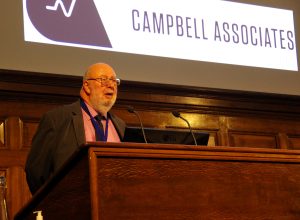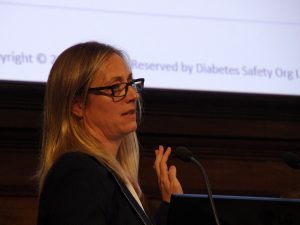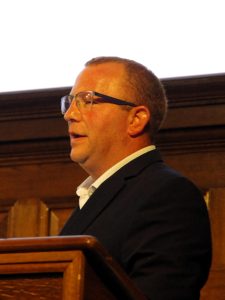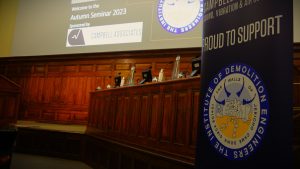Safety and progress were the watchwords this year as Members of the Institute of Demolition Engineers gathered in the magnificent surroundings of One Great George Street in London for the Autumn Seminar of 2023.
A series of speakers offered insight into current issues facing our industry, alongside an opportunity to gather with colleagues, network and share experiences over lunch.
A common theme throughout many of the day’s talks was the need for IDE members to offer their expert advice and experience for the benefits for the wider construction industry.
Indeed health and safety, and our role in effecting change, featured heavily during the morning session, following a welcome by IDE President Vernon Watson.
Mr Watson, who is coming to the end of the first year of his two-year presidency, reinforced the importance of the IDE seminars to the cohesion of the institute. These seminars are what keep the institute going,” he said. “So we are grateful for your support.”
The first talk of the morning was by Jan Andresen, HM Principal Specialist Inspector of Health and Safety – Construction.
He discussed a tragic case of a wall collapse at a metal recycling yard in Birmingham earlier this year, in which five men died, as an illustration of the importance of a rigorous consideration of safety regarding retaining walls.
The physical elements of the piling of aggregates were discussed, as well as the penalties imposed on those held responsible for the accident – nine months each in jail for two directors, alongside £1.6m in fines.
“As demolition engineers you are the providers of competent advice,” he said. “If you provide that advice then incidents are less likely to happen.”
John Woodward, former IDE President, spoke next, highlighting six areas of consideration for members for 2024. These topics included:
- Risk assessments for electric vehicles as they grow in usage (the London Fire Brigade alone have dealt with 143 EV fires this year)
- Specific, not generic, risk assessments for potentially vulnerable people
- Temporary works review and action – the importance of proper procedures given the life-threatening potential of accidents
- Vehicle and pedestrian segregation to minimise the risk of accidents
- How to take measures to minimise risks to members of the public, of whom 68 people died in work related accidents in 2022/23
- How to minimise the chances of accidents on routine jobs such as skip delivery, machine hose replacement, tyre changes, demolition screen fitting.
Next up was Steve Andrew, the Decommissioning, Decontamination and Demolition Lead for global sustainability firm ERM.
He talked through some interesting recent projects his organisation has carried out, with the discussion covering the issue of the non-removal of redundant assets, the dangers of old and apparently redundant parts and equipment.
“Our clients’ skill sets are in producing product and chemicals,” he said. “They don’t understand decommissioning.
“We really need to push our industry forward as a source of expertise that people can bring in early in the preparation phase of a job. We need to challenge everything. Don’t assume that what you’re being told is safe, actually is.”
Following a break for coffee was Jason Dobson, technical sales manager at Spillard Vehicle Safety Systems Ltd, which specialises in providing blind spot management and raising awareness of site hazards.
He discussed visibility and the danger of blind spots, particularly with machines like excavators. A key takeaway was that blind spots can be found not only to the rear of vehicles but also in front. Accidents can happen when someone may be kneeling down to picking up a hard hat, or tying a shoelace. Alternatively a dumper truck with a full load might easily be blocking the driver’s view of the path ahead.
Mr Dobson’s company has developed an AI Human Detection System which warns both the driver and the people on the ground and also sends a report to management, for future improvements.
Next we heard from Cormac McLean, project engineer at De-Construction Solutions, about sustainability. Having spent six years in the construction industry he now works as a consultant.
“In my opinion, getting up to speed with sustainability, particularly around re-use of materials, is the biggest challenge our industry faces,” he said. “We’re going to need to change the way that we function because it’s a completely new market. It’s a problem that we all have to fix together but as an industry we like solving problems, so let’s get on with it.”
Mr McLean’s talk provoked a lively discussion afterwards about what the Institute can do as an organisation to help promote more sustainable methods of demolition and construction. A solution was a need to communicate effectively to structural engineers and architects about re-use.
Stephen McCann of Perses Group then delivered a virtual presentation on being an expert witness. Mr McCann has worked on more than 50 cases, most of which are fall from height accidents. He briefed the attendees about the ins and outs of being an expert witness, as well as the various demands and the expectations of drafting a report before responding to its criticisms.
After lunch, delegates received a talk from Dr Asselia Katenbayeva, Research Associate at The Alliance for Sustainable Building Products about the financial viability of the re-use of material.
She discussed her work on the DISRUPT (Delivering Innovative Steel ReUse ProjecT) project, which seeks to explore the innovative reuse of structural steel in construction and encourage the adoption of new circular economy business models that can help tackle the climate emergency.
The project runs for 18 months from May this year, closing at the end of 2024, and Dr Katenbayeva and her colleagues are keen for industry input. Please contact her at asselia@asbp.org.uk.
Howard Button, IDE trustee and former CEO of the NDFC, supported Dr Katenbayeva’s project, saying: “This is an important opportunity for us to feed our expertise back to Government, to say that we can pioneer the re-use of materials if it is financially viable and if we have more time on projects. We understand that we need a better deal out of this concept if we are to make it work.”
The day came to a close with a talk from Kate Walker, CEO of The Diabetes Safety Organisation, regarding diabetes safety in the workplace. Her talk focused on the impacts of the rapidly rising type 2 diabetes, which often goes undiagnosed.
“There’s a massive stigma around the condition, with people being concerned that they’re going to lose their jobs,” she said. “So if we can get the conversation started, I think it’s about awareness and education coming first, then testing coming second.”
The next IDE event will be the 47th AGM held at the Grand Hotel in Birmingham on Friday, November 10th.






